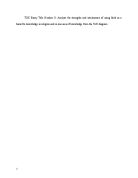Analyze the strengths and weaknesses of using faith as a basis of knowledge in religion and one other area of knowledge from the TOK diagram.
Analyze the strengths and weaknesses of using faith as a basis of knowledge in religion and one other area of knowledge from the TOK diagram.
There are several strengths and weaknesses in using faith as a basis of knowledge in religion and ethics. Faith provides for a strong belief in the doctrines of a religion, based on spiritual belief rather than proof. Nevertheless, with a significant amount of religions in the world, a person’s faith can alter due to the religion which is practiced. Referring to ethics, faith contributes to define clear, definitive ways in which one must act in society. This begs the question: To what extent does faith dictate an individual’s ethics and morals?
To fully grasp the context of faith and its impact in religion, faith must be defined. Faith is vital to the practice and understanding of any religion. Without faith, religions could not exist. Faith aids the spiritual connections in religion, as well as constructing a foundation of beliefs that enable an individual to practice their religion to the fullest extent. Faith is based fully on perception and emotion. Religions are based upon higher beings, and there is no other way to connect to them other than with faith, hence a spiritual connection. Just as Christians worship God, and Hindus worship Brahma, faith provides a way to spiritually connect to such higher beings, which only benefits the worshiper with more knowledge. The knowledge of faith strengthens the worshiper by accommodating them with a way to connect to their god and to practice their religion fully.
Similarly, faith strengthens one’s knowledge in ethical practices (moral principles that govern a person's or group's behavior) by providing examples on how to act. Each religion possesses its own ethical background, but faith is the only aspect of the religion that is able to set a path of just behavior. For example, having faith in Christianity’s ten commandments permits one to become fully knowledgeable in their religion’s moral behavior. This strengthens one’s basis of knowledge in ethics because it is supporting one’s morally just views which is required of their religion. Conjointly, the moral system of the Islam requires worshipers to obtain faith in order to “establish virtue and eradicate vice, to bid good and to forbid wrong” (The Moral Principle of Islam). Islamic ethics focus on a system of life based on good, and that is free from all evil. This strengthens one’s knowledge of good, rather than evil, and because of faith, they are able to practice such doings. As it is shown through the different faiths, perception on ethics may be altered due to their religious faith. While the practices of Christianity may be similar to the practices of the Islam, the perception of both of those religions may be different for diverse individuals. Perception is always going to be a relevant determining factor in strengthening or weakening one’s faith because the way one perceives religions will always be different from someone else’s perception. One can see Christianity being a rightfully just religion, while one can see Christianity to be an unethical religion because it has faith in moral principles in which they do not agree with. This alters their ethical views because they are discriminating against another religion not of their own.







